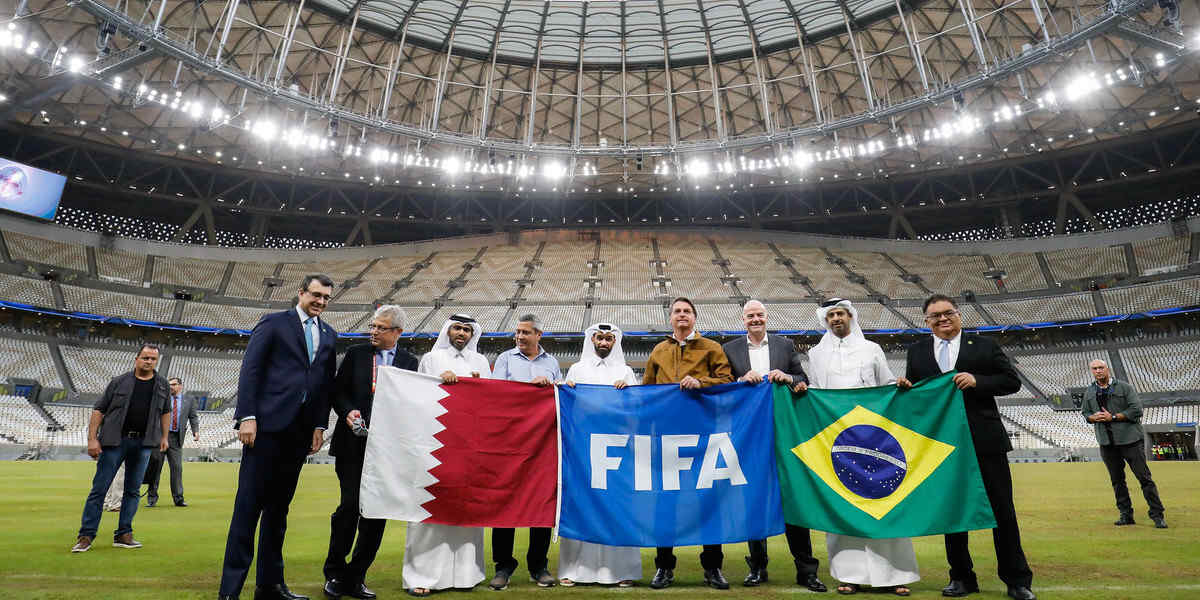The men’s Fifa World Cup finals in Qatar are well underway. This is the first time the biggest stage in world football has played out in the Middle East and it ushers in a new age in the geopolitics of both sport and energy.
The tournament has been controversial from its inception – so much so that it would be impossible to list every instance here. Amid horrendous human rights abuses, with as many as 7,000 migrant workers dying building the stadiums, warnings issued to travelling LGBTQ+ supporters to ensure their safety, draconian crackdowns on international media and laughable claims that the tournament will be ‘carbon-neutral’, it really is a World Cup like no other.
The Gulf state’s ascendency to World Cup hosts is a symptom of shifts underway within elite football and the global economy, as Qatar seeks to leverage the soft power of sport to improve its standing. This is nothing new: governments have long used international sporting events to launder their reputations and bolster nation-building ambitions. This act, known as sportswash, is prevalent in the top flight of football in England and across Europe.
Ascendancy
Qatar’s hosting of the biggest footballing event in the sports calendar marks its growing dominion over global fossil fuel markets. As nations – especially in Europe – attempt to rid themselves of reliance on Russian gas, Qatar is emerging as the favourite to fill this energy vacuum. It is already one of the largest exporters of liquified natural gas (LNG), with fossil fuel exports increasing by over 100 per cent in 2022. Since the war in Ukraine began, Qatar has penned a number of huge deals with energy importers desperate to end their dependence on Russian fossil fuel exports.
Germany, which at the onset of the invasion in Ukraine was importing nearly a third of its primary energy from Russia, is close to signing a massive 15-year gas deal with Qatar as part of the state’s North Field Expansion project. The North Field, a gas field which Qatar shares with Iran, is the world’s single biggest gas field, with as much recoverable reserves in it as all the other operational fields around the world combined. It is a carbon bomb of epic proportions that contains a potential 43.3 gigatonnes of carbon emissions – more than four times the 2020 annual emissions of the world’s largest emitter, China.
QatarEnergy, the state-owned oil and gas firm and main sponsor of this ‘carbon-neutral’ World Cup, is investing $56 billion on expanding gas production by 2030. Only one other fossil fuel firm is set to spend more: Gazprom. Russia, which hosted the 2018 World Cup, has apparently been instrumental in aiding the organisation of this World Cup, with the Emir of Qatar recently thanking Putin for Russian support and saying that he is ‘proud’ of the relationship between the two states.
Trouble brewing
The international backlash against Fifa, the World Cup and the state of Qatar has been palpable. A number of French cities, such as the capital Paris, will boycott the screening of matches in public spaces due to the human rights abuses and some of the more outspoken footballing legends, such as Eric Cantona, have confirmed that they will not be watching the tournament. Others, such as David Beckham, Tim Cahill and Samuel Eto’o, have been paid handsomely to act as ambassadors for the tournament.
To pre-empt any disruption during the tournament, the Qatari state has reinforced its policing capabilities. Moroccan police officers are being brought in to help manage crowds, while Turkish drones, Italian frigates and British Typhoon and Hawk Mk167s jets have all been dispatched. South Korea will be providing counter- terrorism officers for the duration of the tournament and additional surveillance technology has been purchased from the US. Pakistan is also providing troops for World Cup security, alongside Nato forces.
The embarrassment of cyberattacks is something Qatar wants to avoid too. The Gulf state splashed an estimated $1.1 billion to prevent cyber-attacks on fans, athletes, stadiums and other critical infrastructures. Much like the stadiums, these tools of surveillance, policing and geopolitical security will continue to be used after the tournament ends, leaving a legacy of their own.
Peak sportswash
The World Cup in Qatar may feel like sportswash reaching its peak. Yet on the evidence so far, it seems only to be ushering in a new age of extremes – in which the world of sport is not only hijacked to improve the reputations of the disreputable but is used as a vehicle to buttress a state’s geopolitical standing within an increasingly divided and fragile international community.
The symbolism of Qatar taking the baton from Russia is accentuated by the widespread allegations of corruption within Fifa. Both Russian and Qatari officials have been accused of bribing Fifa officials to sway the executive committee’s decision over who got to host the 2018 and 2022 World Cups. Of course, each nation vehemently denies these allegations and had their names cleared by the 2014 Garcia Report, despite some describing the corruption investigation as ‘a joke’.
During the World Cup bid process, the destiny of both Russia and Qatar appeared conjoined. But as the former vacates global commodity markets, the latter is emerging as a fossil fuel superpower: abundantly endowed, absurdly wealthy, and all too willing to feed the global economy’s addiction to fossil fuels.










